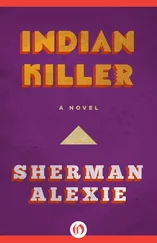“Hello,” she said. “You must be new?”
She had a slight accent, so she was probably a first-generation immigrant. She’d probably been in the United States for twenty-five years. She’d been here long enough to become a crossword solver. Sherwin realized that he had no idea if crossword puzzles were written in other languages. Were other languages flexible enough?
“Are you new?” the Korean woman asked again. She was missing a lower front tooth. This made her look somehow younger, even impish. Don’t be condescending, Sherwin chastised himself.
“Yes, I’m new,” he said. “C Group.”
“Welcome, welcome,” she said. “We’re like a family here.”
“So I’ve heard.”
“Yes, just like a family. Like my family. My big sister is a legendary bitch. Just like that bitch over there.”
She pointed a pencil at another elderly woman, a white woman wearing thick glasses. Didn’t she know that one could purchase plastic lenses these days?
“Why is she a bitch?” Sherwin asked.
“Because she always beats me. And because she always apologizes for beating me. Young man, you must never apologize for being good. It makes the rest of us feel worse about ourselves.”
“Okay, good advice,” Sherwin said. “So I guess I should tell you that I really don’t belong in Group C. I’m better than that.”
“So you think you can beat me?”
“I’ve timed myself with puzzles. I’m fast.”
“I’m sure you are.”
A volunteer set the first puzzle — freshly printed on fine cotton paper — facedown on the table in front of Sherwin.
“So what happens now?” Sherwin asked.
“When they say go, you turn over the paper and do your puzzle. When you’re finished, raise your hand, and somebody will mark your time, and then they’ll collect your puzzle and check it for accuracy. And they’ll measure your score against all the other C Group puzzlers.”
“The woman said they’d move me up to B if I did well enough.”
“Why don’t you just do the first puzzle and see what happens? What’s your name anyway?”
“Sherwin.”
“I’m Mai. What do you do when you aren’t solving puzzles?”
“I’m a writer.”
“Oh. Have you written anything I might have heard of?”
“Doubtful. I wrote poems and short stories. I never sold much. And never won any awards. I wrote a couple of movies, too. But they never got made.”
“What are you working on now?”
“Oh, I don’t write anymore.”
“Why not?”
“My talent dried up and blew away in the wind,” Sherwin said. “I am the Dust Bowl.”
“I’m sorry to hear that.”
“I’m sorry to say it.”
Sherwin had never before confessed aloud his fears that his talent was gone forever. And now that he had, he realized that he would never write again. Not like he had. Was that so bad? He’d written two decent books and two bad ones. How many people in the world had written and published anything? Because he’d stopped writing, Sherwin had been thinking of himself as a failure. But perhaps that wasn’t it. Perhaps he had only been destined to be a writer for that brief period of time. After all, there must be at least one person in the world who had loved his books — who still loved his work — so perhaps that made it all worthwhile. Wasn’t everything temporary anyway?
“Okay, wait, Sherwin, enough of the biography,” the Korean woman said. “Here we go.”
“Puzzlers,” the emcee said, “start your puzzles.”
Sherwin and the Korean woman, and a few hundred other puzzlers, flipped over their papers and started working. Sherwin quickly filled three Across answers and one Down, but then stalled. He read through the clues and found that he didn’t know any of them offhand. He was stuck already. Thirty seconds into his first puzzle and he was frozen. Words were failing him. Again and again, they failed him. He stared blankly at his mostly empty grid for one minute and three seconds and was shocked when the Korean woman raised her hand.
“You’re done?” he asked.
“You’re not supposed to talk,” she said.
“But you’re really done that fast?”
“Yes, but that bitch up there beat me again.”
Sherwin checked out of the hotel, caught a taxi to the airport, and the flight to Chicago that would connect him to the flight back home to San Francisco.
On the second leg, somewhere over Wyoming, Sherwin pulled out the New York Times and found the crossword. It was Saturday, so this puzzle would probably be difficult to solve. Sherwin vowed to solve it, quickly and accurately. He wanted redemption. Here, in the airplane, he was able to fill in a few boxes, but not many. The puzzle remained mostly unsolved.
He was ready to crumple the paper into a ball and stuff it into the seat pocket in front of him when he became aware that he was being watched. One row behind him, to the left and across the aisle, a man was simultaneously working the airline magazine crossword puzzle and watching Sherwin work his New York Times puzzle. The airline magazine puzzles were embarrassingly easy. But the man was obviously struggling and was embarrassed by his struggles.
“I’ll figure this out,” he said to Sherwin, “but you, man, you’re working the Times puzzle. You must be a genius.”
“Maybe,” Sherwin said.
Wanting to confirm the man’s opinion, Sherwin again studied the puzzle. He tentatively filled in one answer. It was wrong, surely it was wrong; ALPINE could not be the right answer. It made no sense. But it fit the squares. It put ink on the page. Sherwin felt good about that, so he filled in another answer with the wrong word. And then he filled in another. In a minute, he finished the puzzle. He’d filled nearly all the boxes with incorrect and random words like music and screenwriter and fear but the man behind him could not tell that Sherwin was faking it. He could only see Sherwin finishing the difficult puzzle in record time. Wow, the man thought, he’s barely even reading the clues. He’s a crossword machine. He’s a crossword cyborg. He’s a crossword killer. He’s a crossword Terminator.
When Sherwin filled in the last blank, he sighed with satisfaction, folded the paper in half, and slid it into the seat pocket in front of him. Then he looked back at the man behind him and smiled. The man gave him a thumbs-up. It was such an eager and innocent gesture that Sherwin felt guilty for his deception. But then he laughed at himself, at his gift for lying.
I am a lying genius, Sherwin thought. And what is lying but a form of storytelling? Sherwin realized that he’d told a story, the first story he’d told in public for any kind of audience since he left Hollywood. But wait, did this really count as storytelling? Well, he’d entertained one man, right? And then Sherwin realized what he’d truly just done. And he roared with laughter and startled a few of his fellow passengers with the volume of his joy.
Sherwin realized that, for years, he’d been running away from a wildfire, an all-consuming inferno that had turned his words into cinder and ash, but he’d just now set an escape fire; he’d told a lie, a story, that convinced him he might be capable of putting a story on the page. Or was this all delusion? Sherwin knew there was a pen in his left inside coat pocket. He could feel it there. And there was paper everywhere on this airplane. He had ink; he could get paper. Oh, he wondered, oh, do I have the strength to begin again? Do I have the courage to step into a dark theater, hold hands with a beautiful woman, and fall back in love with my innocence?
These days, it’s too easy to make mix tapes.
Читать дальше












